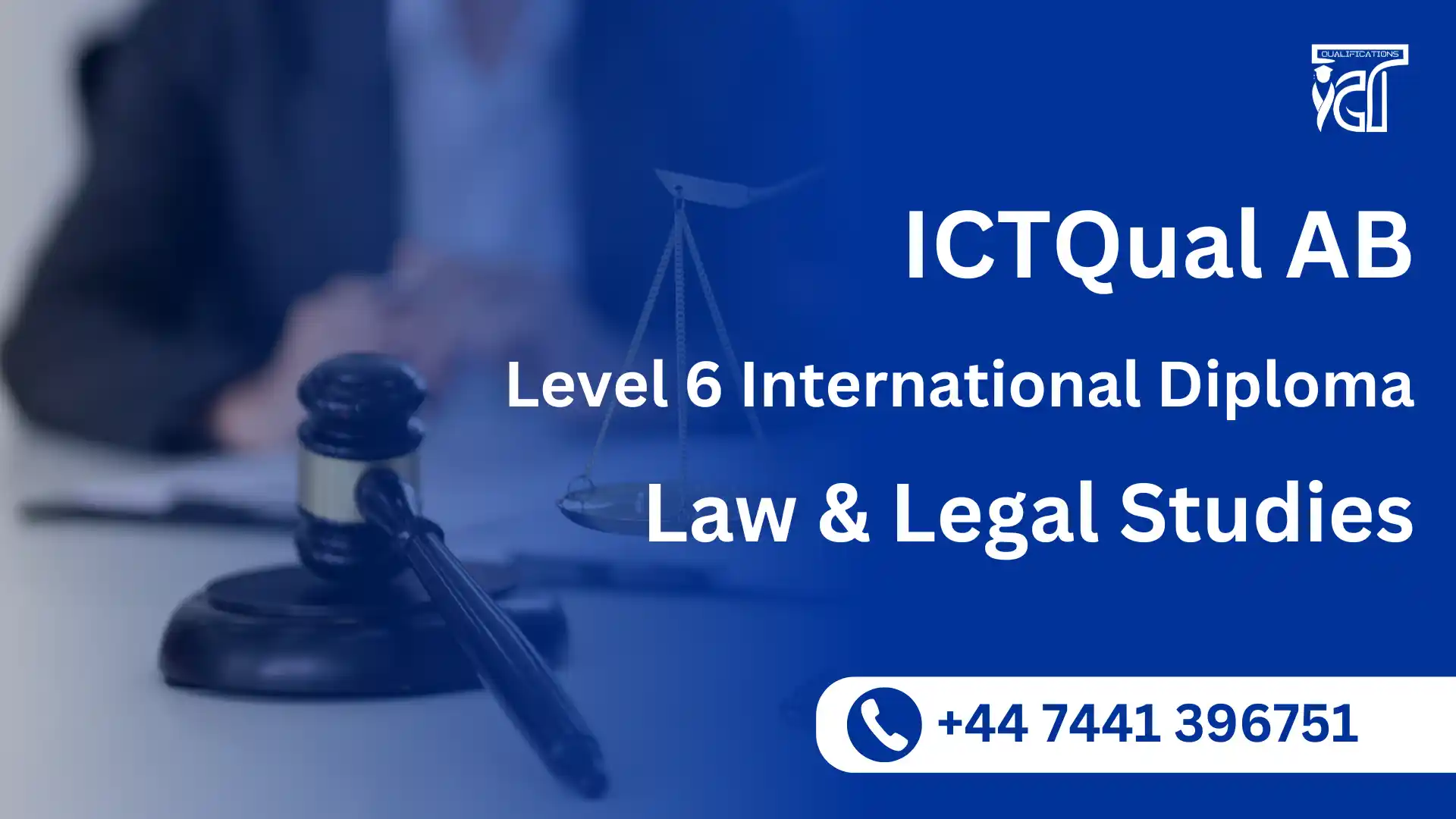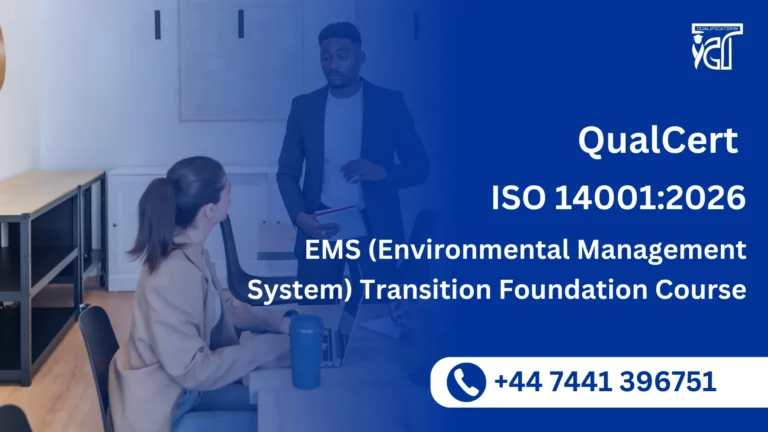The ICTQual AB Level 6 International Diploma in Law & Legal Studies is a comprehensive programme designed to provide learners with an in-depth understanding of legal principles, practices, and frameworks at both national and international levels. Spanning a three-year duration with a 360-credit structure, this diploma is ideal for both freshers seeking a solid foundation in law and professionals aiming to enhance their expertise, advance their careers, or specialise in legal studies and practice.
Learners will acquire critical analytical skills, legal research capabilities, and a practical understanding of diverse areas of law, including civil, criminal, corporate, and international law. The ICTQual AB Level 6 International Diploma in Law & Legal Studies equips learners with competencies in legal reasoning, case analysis, drafting, and negotiation, ensuring they are well-prepared to navigate complex legal environments. Through a combination of theoretical knowledge and applied learning, learners develop the confidence and expertise required to make informed decisions, provide effective legal counsel, and contribute meaningfully to legal and regulatory processes.
Upon completion the ICTQual AB Level 6 International Diploma in Law & Legal Studies, learners can explore a wide range of career opportunities in law firms, corporate legal departments, government agencies, regulatory bodies, NGOs, and international organisations. The diploma also serves as a robust foundation for those pursuing higher education, specialisation in specific legal fields, or roles in policy development and legal consultancy.
Key benefits of the ICTQual AB Level 6 International Diploma in Law & Legal Studiesinclude a structured learning path that fosters intellectual growth, exposure to contemporary legal issues, and the development of transferable skills highly valued across professional sectors. Learners benefit from practical applications, enhanced professional credibility, and preparation for leadership or advisory roles in legal and regulatory environments.
The ICTQual AB Level 6 International Diploma in Law & Legal Studies is tailored for learners committed to excelling in the legal profession, whether starting their career journey or seeking to elevate their current expertise, providing the knowledge, skills, and confidence required to thrive in today’s dynamic legal landscape.
ICTQual AB Level 6 International Diploma in Law & Legal Studies
This qualification, the ICTQual AB Level 6 International Diploma in Law & Legal Studies, consists of 36 mandatory units.
Year 1 – Foundation in Political Science & International Relations
- Introduction to Political Science
- Foundations of International Relations
- Comparative Politics and Government Systems
- Political Ideologies and Theories
- History of Political Thought
- Principles of Public Administration
- Introduction to International Organisations
- Global History and World Politics
- Political Communication and Media Studies
- Research Methods in Political Science
- Human Rights and Social Justice
- Introduction to Diplomacy and Foreign Policy
Year 2 – Intermediate Political Science & International Relations
- Advanced Political Theory and Analysis
- International Law and Global Governance
- Political Economy and Development Studies
- Regional Studies: Europe, Asia, Africa, and the Middle East
- Conflict Resolution and Peace Studies
- Political Sociology and Social Movements
- Policy-Making and Public Policy Analysis
- International Political Economy
- Comparative Foreign Policy
- Security Studies and Global Challenges
- Research Methods and Data Analysis in Politics
- Ethics and Professional Practice in Political Science
Year 3 – Advanced Political Science & International Relations
- Contemporary Issues in International Relations
- Strategic Studies and National Security
- International Diplomacy and Negotiation
- Policy Analysis and Political Reform
- Globalisation and Transnational Politics
- Leadership and Governance in Political Institutions
- International Conflict and Crisis Management
- Political Risk Analysis and Strategic Decision-Making
- Environmental Politics and Global Sustainability
- International Cooperation and Development Projects
- Innovation and Emerging Trends in Global Politics
- Capstone Project in Political Science & International Relations
Learning Outcomes for the ICTQual AB Level 6 International Diploma in Law & Legal Studies:
Year 1 – Foundation in Political Science & International Relations
Introduction to Political Science
- Understand the scope, nature, and significance of political science.
- Identify key political concepts, principles, and processes.
- Recognise the role of governance and institutions in shaping society.
- Apply introductory political knowledge to global contexts.
Foundations of International Relations
- Explain the basic theories of international relations.
- Understand the role of states, non-state actors, and global organisations.
- Analyse factors that influence global cooperation and conflict.
- Develop awareness of historical and contemporary IR debates.
Comparative Politics and Government Systems
- Compare political systems and governance models across nations.
- Evaluate the strengths and weaknesses of different political structures.
- Understand electoral systems and institutional frameworks.
- Interpret comparative case studies to assess political outcomes.
Political Ideologies and Theories
- Identify key political ideologies such as liberalism, socialism, and conservatism.
- Analyse the impact of ideologies on governance and policies.
- Distinguish between classical and modern political theories.
- Apply ideological frameworks to current political issues.
History of Political Thought
- Trace the evolution of political thought from ancient to modern times.
- Evaluate the contributions of major political philosophers.
- Understand the historical context shaping political theories.
- Assess the relevance of classical ideas in contemporary politics.
Principles of Public Administration
- Understand the foundations of public administration.
- Analyse the role of government institutions in policy implementation.
- Apply management principles to public sector organisations.
- Evaluate the challenges of transparency and accountability.
Introduction to International Organisations
- Identify the structure and purpose of global organisations.
- Explain the role of the UN, WTO, IMF, and other bodies.
- Assess their impact on global governance and diplomacy.
- Analyse limitations and challenges faced by international organisations.
Global History and World Politics
- Understand key historical events shaping world politics.
- Analyse global transformations, wars, and revolutions.
- Connect historical contexts with current international issues.
- Evaluate the role of colonialism, independence, and globalisation.
Political Communication and Media Studies
- Understand the relationship between politics and media.
- Analyse the role of communication in shaping public opinion.
- Evaluate the impact of social media on political participation.
- Develop skills in interpreting political discourse.
Research Methods in Political Science
- Apply qualitative and quantitative research methods.
- Design and conduct basic political science research.
- Analyse data and present findings effectively.
- Understand ethical considerations in research.
Human Rights and Social Justice
- Understand the foundations of human rights principles.
- Analyse human rights frameworks at global and regional levels.
- Evaluate issues related to justice, equality, and discrimination.
- Assess mechanisms for human rights protection.
Introduction to Diplomacy and Foreign Policy
- Define the principles of diplomacy and foreign policy.
- Understand diplomatic practices and negotiation strategies.
- Analyse the role of foreign policy in state relations.
- Evaluate case studies of diplomatic interactions.
Year 2 – Intermediate Political Science & International Relations
Advanced Political Theory and Analysis
- Critically evaluate modern political theories.
- Apply theoretical frameworks to complex political issues.
- Analyse debates on power, authority, and legitimacy.
- Compare perspectives from different political schools of thought.
International Law and Global Governance
- Understand the principles of international law.
- Evaluate treaties, conventions, and global legal frameworks.
- Analyse the role of international courts and tribunals.
- Assess the challenges of global governance.
Political Economy and Development Studies
- Analyse the relationship between politics and economics.
- Understand theories of development and underdevelopment.
- Evaluate economic policies shaping national progress.
- Assess the role of global institutions in economic governance.
Regional Studies: Europe, Asia, Africa, and the Middle East
- Examine political systems within different regions.
- Understand cultural, historical, and socio-political dynamics.
- Compare regional integration models like EU, AU, ASEAN.
- Assess regional conflicts and cooperation initiatives.
Conflict Resolution and Peace Studies
- Understand theories of conflict and peace.
- Apply negotiation and mediation strategies.
- Evaluate peacebuilding and reconciliation approaches.
- Analyse global case studies of conflict resolution.
Political Sociology and Social Movements
- Analyse the link between politics, society, and culture.
- Understand the role of social movements in shaping policies.
- Evaluate civil society’s role in governance.
- Assess the impact of political participation and activism.
Policy-Making and Public Policy Analysis
- Understand the stages of policy formulation and evaluation.
- Analyse case studies of national and international policies.
- Apply analytical frameworks for assessing policies.
- Evaluate the impact of policies on social development.
International Political Economy
- Analyse trade, finance, and global markets.
- Understand power dynamics in international economic relations.
- Assess the role of multinational corporations in politics.
- Evaluate policies influencing global economic governance.
Comparative Foreign Policy
- Analyse foreign policy decisions across nations.
- Understand the domestic and external influences on policy.
- Evaluate strategies of major global powers.
- Compare foreign policy case studies for practical insights.
Security Studies and Global Challenges
- Understand the concept of security in international relations.
- Analyse threats such as terrorism, cybercrime, and climate change.
- Evaluate national and international security strategies.
- Assess global responses to emerging security challenges.
Research Methods and Data Analysis in Politics
- Apply advanced research design and methodologies.
- Use data analysis tools to interpret political information.
- Conduct field research and surveys effectively.
- Present findings in structured academic formats.
Ethics and Professional Practice in Political Science
- Understand ethical principles in political practice.
- Evaluate dilemmas in governance and public policy.
- Apply ethical decision-making in professional settings.
- Promote integrity and accountability in political careers.
Year 3 – Advanced Political Science & International Relations
Contemporary Issues in International Relations
- Analyse modern global issues such as migration, pandemics, and energy crises.
- Evaluate the impact of these issues on international cooperation.
- Assess state and non-state actor responses.
- Connect theoretical knowledge with practical global challenges.
Strategic Studies and National Security
- Understand defence strategies and security frameworks.
- Analyse military doctrines and strategic policies.
- Evaluate national security policies of different states.
- Assess the role of intelligence in decision-making.
International Diplomacy and Negotiation
- Apply advanced diplomatic strategies in practice.
- Analyse high-level negotiation case studies.
- Understand the influence of soft power in diplomacy.
- Develop practical skills in conflict negotiation.
Policy Analysis and Political Reform
- Evaluate frameworks for analysing public policies.
- Assess the impact of reforms on governance.
- Compare reform strategies in different nations.
- Apply policy analysis tools to real-world cases.
Globalisation and Transnational Politics
- Understand the impact of globalisation on states.
- Analyse the role of transnational actors.
- Evaluate the effects of global interconnectedness.
- Assess both positive and negative consequences of globalisation.
Leadership and Governance in Political Institutions
- Understand principles of political leadership.
- Analyse governance systems and their effectiveness.
- Evaluate challenges in leadership at global and local levels.
- Apply leadership theories to political contexts.
International Conflict and Crisis Management
- Understand crisis management principles in international politics.
- Evaluate strategies for preventing and resolving conflicts.
- Analyse global case studies of crisis interventions.
- Assess the role of international organisations in conflict resolution.
Political Risk Analysis and Strategic Decision-Making
- Apply risk analysis to political and economic contexts.
- Understand decision-making frameworks under uncertainty.
- Evaluate risks in international investment and diplomacy.
- Develop strategies for mitigating political risks.
Environmental Politics and Global Sustainability
- Analyse global environmental challenges.
- Evaluate policies for sustainable development.
- Understand international environmental agreements.
- Assess the role of politics in addressing climate change.
International Cooperation and Development Projects
- Understand frameworks for international cooperation.
- Analyse case studies of development projects.
- Evaluate the role of aid, NGOs, and multilateral initiatives.
- Develop project proposals addressing global development issues.
Innovation and Emerging Trends in Global Politics
- Explore technological and political innovations.
- Assess the impact of digital politics and AI on governance.
- Understand global trends in political participation.
- Evaluate the future of international relations.
Capstone Project in Political Science & International Relations
- Integrate knowledge gained across all years of study.
- Design and conduct a major research project.
- Apply critical analysis and problem-solving skills.
- Present findings in a professional and academic format.
The ICTQual AB Level 6 International Diploma in Law & Legal Studies offers learners a comprehensive set of benefits that enhance both professional expertise and academic knowledge. By completing this programme, learners gain practical legal skills, analytical capabilities, and in-depth understanding of national and international legal frameworks. The course ensures learners are equipped to handle complex legal challenges, make informed decisions, and pursue successful careers in diverse legal and regulatory environments.
1. Advanced Legal Knowledge
- Comprehensive understanding of civil, criminal, corporate, and international law.
- Insights into legal frameworks, statutes, and regulatory systems.
- Exposure to contemporary legal challenges and case law analysis.
- Ability to interpret and apply legal principles effectively.
- Strong foundation for specialised legal practice or academic research.
2. Professional Skill Development
- Enhanced legal research and analytical reasoning skills.
- Competence in drafting legal documents, contracts, and policies.
- Negotiation, advocacy, and conflict resolution abilities.
- Critical thinking applied to complex legal scenarios.
- Practical skills to provide effective legal counsel and advisory services.
3. Career Advancement Opportunities
- Eligibility for roles in law firms, corporate legal departments, and government agencies.
- Opportunities in regulatory bodies, NGOs, and international organisations.
- Preparation for leadership, advisory, and consultancy positions.
- Pathway to higher studies or specialisation in specific legal fields.
- Enhanced employability and professional recognition in the legal sector.
4. Global Perspective & Networking
- Understanding of international law and cross-border legal issues.
- Exposure to global legal practices and regulatory standards.
- Opportunities to network with legal professionals and experts worldwide.
- Development of a professional outlook with international relevance.
- Awareness of ethical standards, compliance, and governance frameworks.
5. Practical & Transferable Skills
- Ability to conduct thorough legal research and case analysis.
- Project management and strategic planning competencies.
- Adaptability to evolving legal, regulatory, and corporate environments.
- Transferable skills applicable across private, public, and non-profit sectors.
- Preparation for continuous professional development and lifelong learning.
The ideal learner for the ICTQual AB Level 6 International Diploma in Law & Legal Studies is someone passionate about law, justice, and governance, whether starting a new career or enhancing existing professional expertise. This ICTQual AB Level 6 International Diploma in Law & Legal Studies suits fresh learners seeking a solid foundation in legal studies, as well as professionals aiming to specialise, advance in their careers, or take on leadership and advisory roles. Learners should be motivated, detail-oriented, and eager to develop analytical, research, and practical skills applicable in diverse legal, regulatory, and international contexts.
1. Aspiring Legal Professionals
- Individuals seeking a career in law firms, corporate legal departments, or government agencies.
- Learners interested in civil, criminal, corporate, or international law.
- Those aiming to develop critical thinking and legal analysis skills.
- Individuals preparing for further studies in law or legal research.
- Learners motivated to build a strong foundation for a professional legal career.
2. Government & Public Sector Employees
- Civil servants and public officials looking to enhance legal knowledge.
- Professionals aiming for leadership or advisory roles in public administration.
- Learners involved in policy-making, regulatory compliance, or governance.
- Individuals seeking strategic decision-making and legal interpretation skills.
- Those wanting to strengthen professional credibility in legal matters.
3. Fresh Learners & Graduates
- Students and recent graduates with an interest in law or legal studies.
- Individuals seeking a structured, internationally recognised learning pathway.
- Learners eager to develop practical legal skills through assignments and projects.
- Those looking to enter the legal profession or related sectors confidently.
- Individuals motivated to acquire transferable skills for diverse career opportunities.
4. International Law & Policy Enthusiasts
- Learners interested in cross-border legal issues and international regulations.
- Professionals pursuing careers in diplomacy, NGOs, or international organisations.
- Individuals aiming to enhance knowledge of compliance, treaties, and global governance.
- Those keen on understanding legal systems in different countries.
- Learners seeking networking opportunities with global legal experts.
5. Lifelong Learners & Knowledge Seekers
- Individuals committed to continuous personal and professional growth.
- Learners passionate about legal research, advocacy, and policy development.
- Those motivated to stay updated with evolving laws and regulations.
- Professionals aiming to strengthen analytical and problem-solving skills.
- Learners seeking comprehensive, practical knowledge applicable across sectors.
Completing the ICTQual AB Level 6 International Diploma in Law & Legal Studies equips learners with the knowledge, skills, and credibility to pursue advanced career opportunities, academic progression, and specialised roles in the legal sector. The ICTQual AB Level 6 International Diploma in Law & Legal Studies ensures learners are prepared to contribute effectively in professional, regulatory, and international legal environments.
1. Legal Practice & Law Firms
- Eligibility for roles in law firms as legal associates or paralegals.
- Opportunities to advance to senior legal practitioner or consultancy positions.
- Involvement in drafting contracts, advising clients, and managing legal cases.
- Specialisation in civil, criminal, corporate, or international law.
- Preparation for leadership or partner-level roles within legal firms.
2. Government & Public Sector Roles
- Careers in regulatory bodies, government agencies, and public administration.
- Advisory roles in policy-making, legislative compliance, and governance.
- Opportunities in legal departments of municipalities or national government.
- Participation in legislative drafting, legal research, and public service projects.
- Pathway to senior administrative or strategic legal positions.
3. International Organisations & NGOs
- Roles in international organisations, human rights institutions, and NGOs.
- Opportunities in legal advisory, compliance, and policy implementation.
- Engagement with cross-border legal matters and global governance frameworks.
- Participation in international arbitration, diplomacy, and conflict resolution.
- Networking with legal professionals and experts across the world.
4. Higher Education & Academic Progression
- Pathway to postgraduate studies such as Master’s or PhD in law or related fields.
- Specialisation in areas like international law, corporate law, or human rights.
- Opportunities for research, teaching, and scholarly publications.
- Access to academic fellowships and international study programmes.
- Strengthening credentials for academic and professional recognition.
5. Corporate & Consultancy Careers
- Positions in corporate legal departments, compliance, and risk management.
- Roles in legal consultancy, advisory services, and strategic planning.
- Opportunities in media, education, and legal research organisations.
- Development of transferable skills applicable across private and public sectors.
- Preparation for entrepreneurial ventures in legal consultancy or advisory services.
As an approved centre of ICTQual AB, we offer learners two clear pathways to achieve the Level 6 International Diploma in Law & Legal Studies.
Route 1: Experienced Professionals
This route is designed for learners who have at least six years of verifiable experience in law, legal practice, compliance, or related sectors. It recognises prior expertise and allows experienced professionals to focus on advanced modules, practical applications, and strategic legal studies. Learners following this route benefit from a streamlined programme that builds on their existing knowledge while enhancing leadership, analytical, and advisory skills.
Route 2: Fresh Learners
This route is tailored for learners who are new to the field or have limited professional experience. Fresh learners are required to complete 36 structured assignments throughout the programme, ensuring they gain a thorough understanding of legal principles, case analysis, and practical applications. This pathway provides a step-by-step learning journey, helping learners develop foundational skills, confidence, and competence to progress in the legal profession.
Entry Requirements
To enrol in the ICTQual AB Level 6 International Diploma in Law & Legal Studies, learners must meet the following entry requirements to ensure readiness for the programme’s academic rigour and professional relevance:
Minimum Age
- Learners must be 18 years or older at the time of enrolment.
- Ensures maturity and readiness for advanced legal studies and professional engagement.
Educational Background
- Completion of secondary education (high school) or an equivalent recognised qualification.
- Preferably, a Level 5 diploma or equivalent in law, legal studies, or related disciplines for advanced preparation.
- Fresh learners without prior diplomas can enrol via the assignment-based pathway.
Experience
- Route 1 (Experienced Professionals): Minimum six years of verifiable experience in law, legal practice, compliance, or related sectors.
- Route 2 (Fresh Learners): No prior experience required; learners complete 36 structured assignments to gain core competencies.
Language Proficiency
- Learners must demonstrate proficiency in English, as the programme is delivered entirely in English.
- Acceptable evidence includes:
- Prior education in English
- IELTS score of 5.5 or above, or equivalent
- Other recognised English language certifications
- Strong written and verbal communication skills are essential for completing assignments and engaging in academic discussions.
Register Now
Qualification Process
Qualification Process for the ICTQual AB Level 6 International Diploma in Law & Legal Studies
- Self-Assessment:
Begin by evaluating your eligibility to ensure you meet the qualification requirements, including work experience, knowledge, and language proficiency. - Registration:
Complete your registration by submitting the required documents, including a scanned copy of a valid ID, and paying the registration fee. - Induction:
An assessor will conduct an induction to confirm your eligibility for the course and explain the evidence requirements. If you do not meet the criteria, your registration will be cancelled, and the fee will be refunded. - Assignments & Evidence Submission:
Provide all assignments and the necessary evidence based on the assessment criteria outlined in the course. If you are unsure of the required evidence, consult with the assessor for guidance on the type and nature of evidence needed. - Feedback and Revision:
The assessor will review your submitted evidence and provide feedback. Evidence that meets the criteria will be marked as “Criteria Met,” while any gaps will be identified. You will be asked to revise and resubmit if needed. - Competence Evidence:
Submit final evidence demonstrating that all learning outcomes have been met. This evidence will be marked as “Criteria Met” by the assessor once it is satisfactory. - Internal Quality Assurance (IQA):
The Internal Quality Assurance Verifier (IQA) will review your evidence to ensure consistency, quality, and compliance with standards. - External Verification:
The IQA will submit your portfolio to ICTQUAL AB External Quality Assurance Verifiers (EQA) for final confirmation. The EQA may contact you directly to verify the authenticity of your evidence. - Certification:
Upon successful completion of all checks, ICTQUAL AB will issue your official certificate, confirming that you have attained the ICTQual AB Level 6 International Diploma in Law & Legal Studies.







